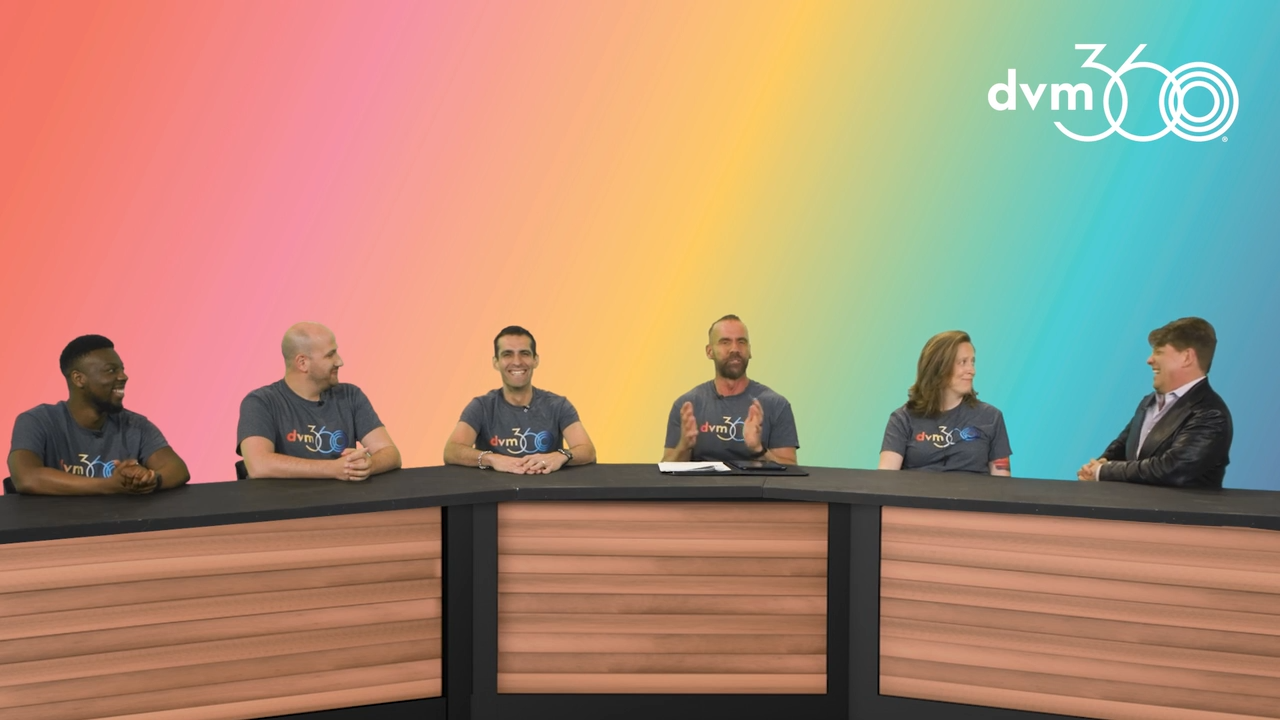
The importance of safety, trust, and equity in the practice

What does a safe, inclusive work space look like?
Content sponsored by Hill's
Adam Christman, DVM, MBA: Well, hello there. My name is Dr Adam Chrisman, chief veterinary officer here at dvm360, and Happy Pride Month. Look at our Pride Month shirts that we're wearing over here, but not Bash. It's quite alright.
Bash Halow, LVT, CVPM: I'm holding up the straight end of the table.
Adam Christman, DVM, MBA: Well, this is a fun, open, transparent conversation where we're gonna be celebrating Pride Month talking about inclusivity and inclusive workspace in vet med, too. So you're probably asking: Who are these wonderful people that are joining me? Well, I'm gonna go ahead and introduce them. My pronouns are he/him, and we'll kick it right over here.
Jennifer Evans: Hi, my name is Jennifer Evans, my pronouns are she/her I've been in veterinary medicine for 21 years.
Bash Halow, LVT, CVPM: And I am Bash Halow, and my pronouns are he/him and I'm owner of Halow consulting. And I'm very happy to be a part of this group.
Adam Christman, DVM, MBA: Thanks, Bash.
Omar Farías, VMD: Hi, I am Dr Omar Farías. My pronouns are he/him. I work for Hill's Pet Nutrition. I'm also the president elect for Pride Veterinary Medical Community.
Erik Zager, DVM, DACVECC: I'm Eric Zager, he/him. I'm a critical care specialist and a partner and head of the critical care service at Philadelphia Animal Specialty and Emergency.
Michael Lark, CVT: Hi, I'm Michael Lark, I am he/him and I work as a licensed veterinary technician. Thank you so much for having me again, Adam.
Adam Christman, DVM, MBA: Yeah, we'd love to thank you for being here, my friends. This is wonderful. This is how we advance together and have this great conversation. So, I want to check what you're seeing in front of you, too. We have quite an array, a good cross section of our profession from practice managers, veterinary technicians, industry leaders, to practice owners. And so I think this is a great conversation to chat about inclusivity in the workspace, and Bash, I want to ask you first how hospital teams create a safe and inclusive work experience. Your're a practice manager and in a lot of practices around the country. So, what does that look like to you?
Bash Halow, LVT, CVPM: Well, in very practical terms, it looks like managers and owners stepping back and asking themselves not just what their gay team members may need or any other minority or protected class employee needs at their practice, but what all of their employees need. So, you know, I know that we may look like an exotic group, but all of us thrive on things like feeling our value, making sure that we have a voice that's heard, making sure that we feel like we're part of a team that's loved, making sure that we have access to growing and that we are cultivated to grow, and certainly equal pay. We all want that. And so does everybody else in the practice want that. So I think if you can focus on that, that's a great start to thinking about what needs to happen to make sure that all of your team members are being taken care of. And then the most important thing is how do you figure out whether or not what it is you're doing is working for all of the team members. And, you know, we made a point to distinguish ourselves with pronouns. And I do think, you know, I think that there's a lot of when we were talking about this a little bit earlier...there's a lot of language in today's today's world about people pushing back on the kind of language that we use. Some people think that's extreme, but I do think that it's important. It's an important step forward to acknowledge how other people may be feeling, and to invite them to be more comfortable. So looking at the language that you use for job descriptions, and then how you talking about roles at the practice is important, maybe not a major step like the ones I just talked about. But it's an important step. And also, I would say finding a way to get people to be honest with you about what's really going on in the practice. And I think that that's a tough thing to do. You know, we always lean on things like coaching sessions, or review sessions, but it's more of a lopsided thing where I'm going to tell you what I think you need to hear. And that's, I think, the wrong way. I think those sessions should be about coaching and coaxing the other person out to talk about what they're feeling and seeing in the workplace. That's probably the best way to identify more opportunities for inclusion, which really are important. I mean, it's not just this, I'm gonna shut up after this. You know, it's not just we're not just going here for something that's zeitgeist. You're looking for diversity, you're looking for, finding, you know, we all know, we've all been through a tough couple of years looking for talent. If there's talent and any member, that of your practice that you can extract, we want to make sure that the pipeline is open for that. So we really want to work towards a time when we can have diversity and we can have as many voices and thoughts going into helping us be successful as we can.
Adam Christman, DVM, MBA: Excellent. Jennifer, what are your thoughts?
Jennifer Evans: I think all of that is valuable information. I do believe that. Creating a safe space for trust for your colleagues is massive because If they can't trust you, they're not going to tell you what they're experiencing. And if I can't express that to you, you're not going to know. And I'm going to continue to suffer in silence. And I believe that trust is just so valuable with starting that safe space.
Adam Christman, DVM, MBA: Yeah, absolutely. And, Michael, you're a veterinary technician. How important it is to, you know, be in an environment that you feel safe accepted, you know, part of the conversation for both you and fellow veterinary technicians?
Michael Lark, CVT: I feel like just bouncing off what Jennifer was saying, you have to be comfortable with expressing how you feel and who you are. I feel like one of the things that go into is , you have to know that this person is willing to receive that information. So I feel like if practices or employers have like visual postings or emails that like show that they support the LGBT community, it can make me or someone else feel comfortable about sharing who they are.
Adam Christman, DVM, MBA: Yeah, absolutely. And, Eric, you're a practice owner in Philadelphia. And you know, nowadays, it's about why it's so hard to try to find talent, but how important is it for you, as a practice owner to identify or encourage a safe working environment? You know, a lot of the new graduates are looking for safe environments, inclusive workspaces...what does that look like for you as a practice owner?
Erik Zager, DVM, DACVECC: Yeah, so I think a lot of it is trying to make sure that that is demonstrated for any person who's coming into the practice, you know, you don't want to be putting on a show for someone who's coming to interview. You want to be living those values. And so making sure that you have representation, you have a diverse team, you have, you know, even things that can seem minor, like gender neutral bathrooms, people pick up on that. And, you know, it is the type of thing where you want to make sure that anytime you have concerns that are brought up by your team, that you take them seriously. Just because you don't personally have that concern doesn't mean that you shouldn't be valuing that concern and others, similar to you know, people who might not be part of the LGBTQ+ community, you don't need to understand it yourself to be able to respect how other people understand that. And I think we're seeing a lot of that much more with the trans community that they're fighting for this where you don't have to understand it, you have to respect someone else's ability to understand that. And you have to demonstrate that in your workplace as well.
Adam Christman, DVM, MBA: Absolutely. And both of you are in industry. So Omar, what does representation look like to you in the veterinary industry side of things?
Omar Farías, VMD: Yeah. So that's a good question. You know, I think when it comes to representation, first of all, we want to see more LGBTQ voices and faces within the veterinary community. I think it's important to have people like in leadership positions, I think panels like this are important. I think reaching out, doing activities, making sure that we are really supporting the different activities and initiatives excuse me, that, that promote diversity and the visibility of our community. Yeah.
Jennifer Evans: You know, I heard I read a book one time that said, diversity is about who you're inviting to the party. Inclusivity is about asking them to dance. But equality is about who's planning the party. And for me, I think that's so important because it's vital, not only as a practice owner or practice manager, but who is planning our parties, because they're going to be the ones that are making all of us including the minority groups feel more comfortable more welcome more at home, in our work setting. So I think representation is massive.
Newsletter
From exam room tips to practice management insights, get trusted veterinary news delivered straight to your inbox—subscribe to dvm360.






